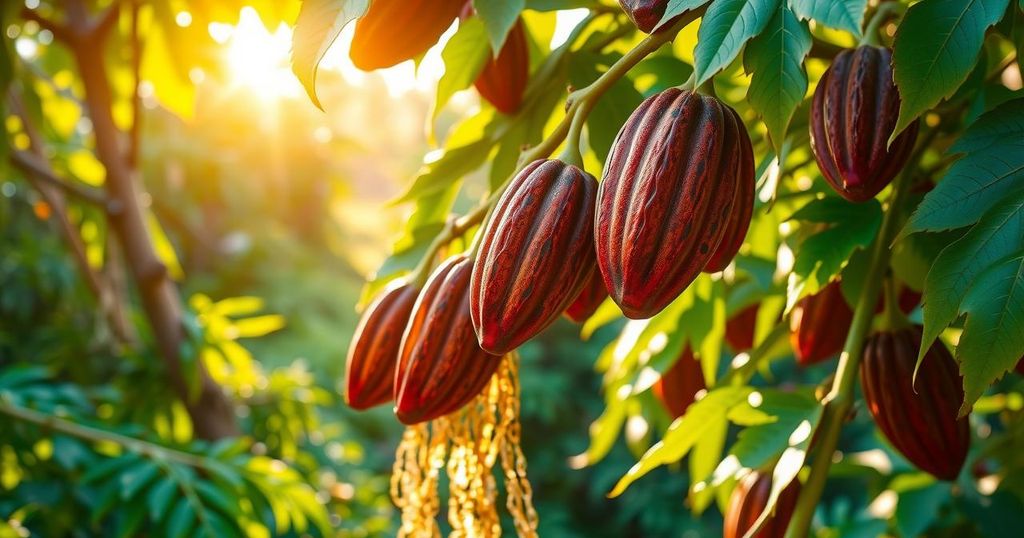Nigeria aims to increase its cocoa production in light of soaring global prices, attracting investor interest while facing challenges related to land, sustainability, and competition from top producers. The government has set an ambitious production target, supported by investment, yet concerns regarding farming practices and market volatility persist.
Nigeria is positioning itself to capitalize on soaring cocoa prices, which recently surged to a record $12,000 per tonne in December. This spike has generated renewed investor interest in the cocoa sector, particularly as competition from top producers Ivory Coast and Ghana declines due to climate challenges and disease. Patrick Adebola, executive director at the Cocoa Research Institute of Nigeria, remarked on the improved conditions for farmers, asserting they have never experienced such favorable circumstances.
In response to these opportunities, over a dozen local companies have sought to invest or expand their cocoa production. Notably, the British government’s development finance initiative has invested $40.5 million in Johnvents, a Nigerian agribusiness. Currently, Nigeria ranks as the seventh largest cocoa producer, yielding over 280,000 tonnes in 2023, according to the UN’s Food and Agriculture Organization. The Nigerian government has ambitious plans to raise production to 500,000 tonnes for the 2024-2025 season, aiming to secure fourth place globally.
However, while Adebola is skeptical about reaching this target in the immediate season, he remains optimistic about future growth fueled by increased efforts to rehabilitate and establish cocoa farms. Both farmers and investors are becoming more cognizant of market dynamics; Nigerian growers face less regulated price structures than their counterparts in Ivory Coast and Ghana. Cocoa futures remain high despite recent declines from record levels, maintaining an elevated price above $8,000 per tonne.
The recent difficulties faced by Ivory Coast and Ghana, including adverse weather and disease impacting yields, have created a stark supply shortage, driving global prices upwards. Even though Nigeria’s cocoa sector has avoided significant climate change effects thus far, growing the crop more widely is fraught with environmental risks. Efforts to promote the cocoa industry through the National Cocoa Management Committee, established in 2022, highlight the government’s commitment to regulating and supporting farmers.
Concerns have arisen regarding agricultural modernization and the trend towards monocrop plantations that focus solely on cocoa. Such practices may jeopardize sustainability and biodiversity, as indicated by a study published in the journal Agroforestry Systems. Moreover, challenges persist as many farmers operate small-scale farms; for instance, Peter Okunde from Ogun state expressed his struggles with limited capital and land for expansion.
In contrast, John Alamu, managing director of Johnvents, has argued that the real issue lies not in land availability but rather in the need for comprehensive support for farmers. He highlighted the importance of providing seedlings, training on agricultural best practices, and focusing on sustainable farming methods to restore Nigeria’s position as a leading cocoa producer.
In conclusion, Nigeria is poised to enhance its role in the global cocoa market, driven by record high prices and the government’s commitment to support cocoa production. While ambitious goals have been set for the sector, challenges such as land availability, environmental sustainability, and regulatory frameworks need to be addressed. The collaborative efforts of local firms and government initiatives may very well steer Nigeria towards reclaiming its status among the top cocoa producers in the world.
Original Source: www.hindustantimes.com






